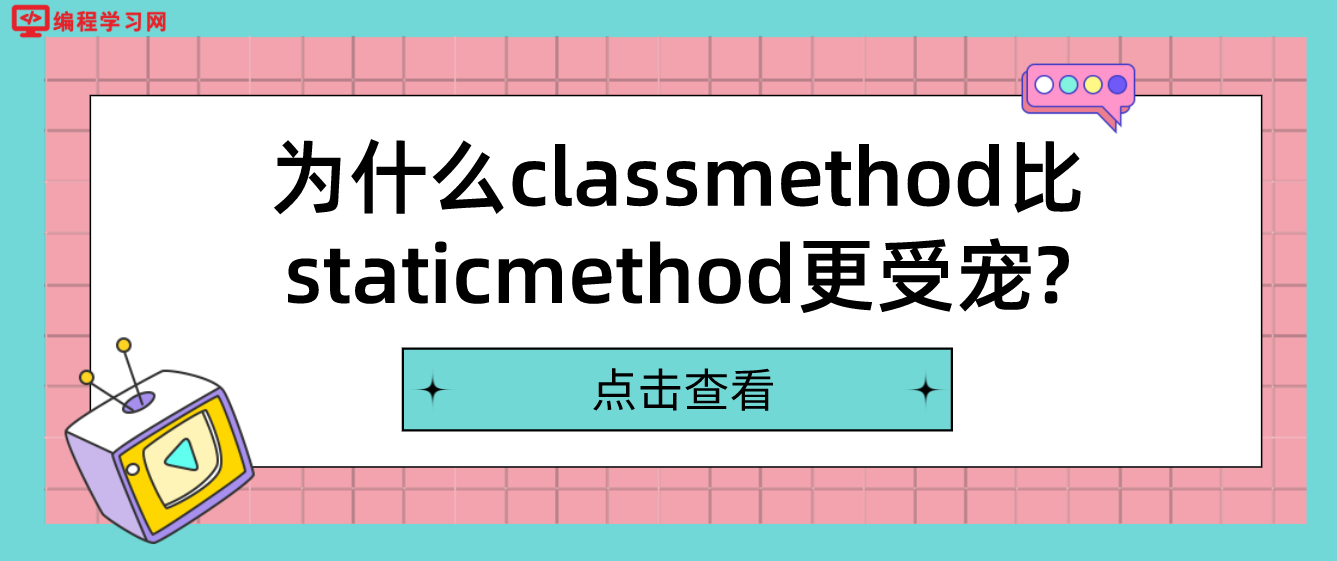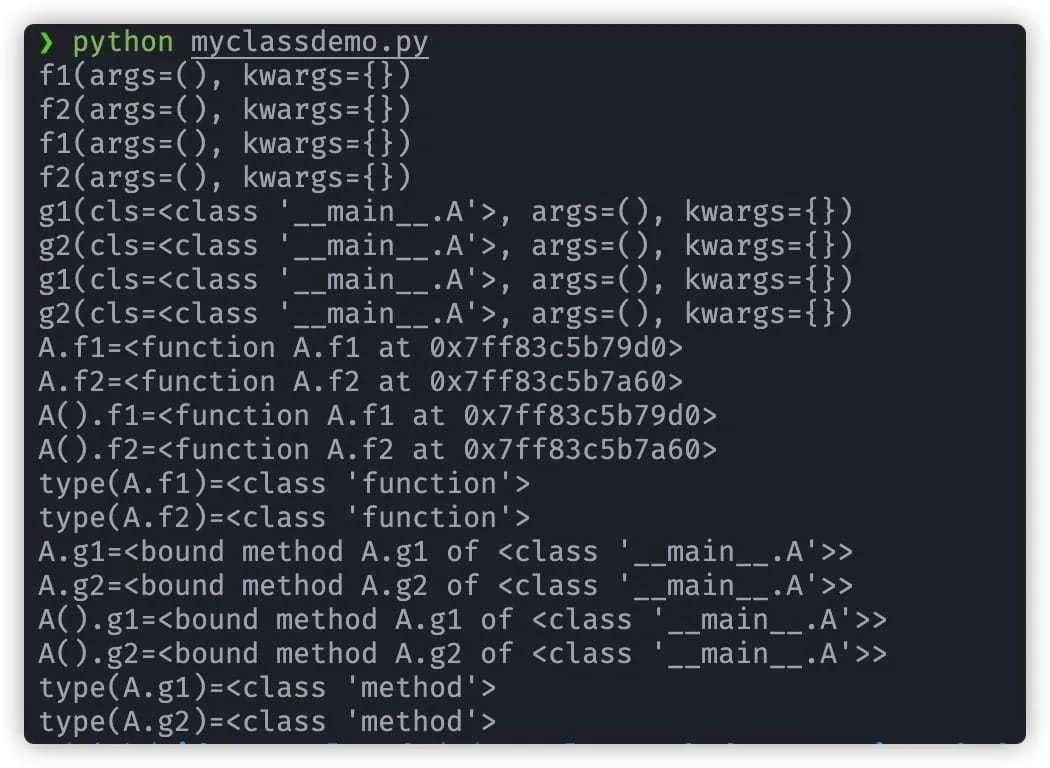
我们知道,classmethod 和 staticmethod 都可以作为函数的装饰器,都可用于不涉及类的成员变量的方法,但是你查一下 Python 标准库就会知道 classmethod 使用的次数(1052)要远远多于 staticmethod(539),这是为什么呢?

这就要从 staticmethod 和 classmethod 的区别说起。
1、从调用形式上看,二者用法差不多
先说下什么是类,什么是实例,比如说 a = A(),那么 A 就是类,a 就是实例。
从定义形式上看,clasmethod 的第一个参数是 cls,代表类本身,普通方法的第一个参数是 self,代表实例本身,staticmethod 的参数和普通函数没有区别。
从调用形式上看,staticmethod 和 classmethod 都支持类直接调用和实例调用。
class MyClass: def method(self): """
Instance methods need a class instance and
can access the instance through `self`.
""" return 'instance method called', self @classmethod def classmethod(cls): """
Class methods don't need a class instance.
They can't access the instance (self) but
they have access to the class itself via `cls`.
""" return 'class method called', cls @staticmethod def staticmethod(): """
Static methods don't have access to `cls` or `self`.
They work like regular functions but belong to
the class's namespace.
""" return 'static method called' # All methods types can be # called on a class instance: >>> obj = MyClass() >>> obj.method()
('instance method called', <MyClass instance at 0x1019381b8>) >>> obj.classmethod()
('class method called', <class MyClass at 0x101a2f4c8>)
>>> obj.staticmethod() 'static method called'
# Calling instance methods fails # if we only have the class object: >>> MyClass.classmethod()
('class method called', <class MyClass at 0x101a2f4c8>)
>>> MyClass.staticmethod() 'static method called'
2、先说说 staticmethod。
如果一个类的函数上面加上了 staticmethod,通常就表示这个函数的计算不涉及类的变量,不需要类的实例化就可以使用,也就是说该函数和这个类的关系不是很近,换句话说,使用 staticmethod 装饰的函数,也可以定义在类的外面。我有时候会纠结到底放在类里面使用 staticmethod,还是放在 utils.py 中单独写一个函数?比如下面的 Calendar 类:
class Calendar: def __init__(self): self.events = [] def add_event(self, event): self.events.append(event) @staticmethod def is_weekend(dt:datetime): return dt.weekday() > 4 if __name__ == '__main__': print(Calendar.is_weekend(datetime(2021,12,27))) #output: False
里面的函数 is_weekend 用来判断某一天是否是周末,就可以定义在 Calendar 的外面作为公共方法,这样在使用该函数时就不需要再加上 Calendar 这个类名。
但是有些情况最好定义在类的里面,那就是这个函数离开了类的上下文,就不知道该怎么调用了,比如说下面这个类,用来判断矩阵是否可以相乘,更易读的调用形式是 Matrix.can_multiply:
from dataclasses import dataclass @dataclass class Matrix: shape: tuple[int, int] # python3.9 之后支持这种类型声明的写法 @staticmethod def can_multiply(a, b): n, m = a.shape k, l = b.shape return m == k
3、再说说 classmethod。
首先我们从 clasmethod 的形式上来理解,它的第一个参数是 cls,代表类本身,也就是说,我们可以在 classmethod 函数里面调用类的构造函数 cls(),从而生成一个新的实例。从这一点,可以推断出它的使用场景:
- 当我们需要再次调用构造函数时,也就是创建新的实例对象时
- 需要不修改现有实例的情况下返回一个新的实例
比如下面的代码:
class Stream: def extend(self, other): # modify self using other ... @classmethod def from_file(cls, file): ... @classmethod def concatenate(cls, *streams): s = cls() for stream in streams: s.extend(stream) return s steam = Steam()
当我们调用 steam.extend 函数时候会修改 steam 本身,而调用 concatenate 时会返回一个新的实例对象,而不会修改 steam 本身。
4、本质区别
我们可以尝试自己实现一下 classmethod 和 staticmethod 这两个装饰器,来看看他们的本质区别:
class StaticMethod: def __init__(self, func): self.func = func
def __get__(self, instance, owner): return self.func
def __call__(self, *args, **kwargs): # New in Python 3.10 return self.func(*args, **kwargs) class ClassMethod: def __init__(self, func): self.func = func
def __get__(self, instance, owner): return self.func.__get__(owner, type(owner)) class A: def normal(self, *args, **kwargs): print(f"normal({self=}, {args=}, {kwargs=})") @staticmethod def f1(*args, **kwargs): print(f"f1({args=}, {kwargs=})") @StaticMethod def f2(*args, **kwargs): print(f"f2({args=}, {kwargs=})") @classmethod def g1(cls, *args, **kwargs): print(f"g1({cls=}, {args=}, {kwargs=})") @ClassMethod def g2(cls, *args, **kwargs): print(f"g2({cls=}, {args=}, {kwargs=})") def staticmethod_example(): A.f1()
A.f2()
A().f1()
A().f2()
print(f'{A.f1=}')
print(f'{A.f2=}')
print(A().f1)
print(A().f2)
print(f'{type(A.f1)=}')
print(f'{type(A.f2)=}') def main(): A.f1()
A.f2()
A().f1()
A().f2()
A.g1()
A.g2()
A().g1()
A().g2()
print(f'{A.f1=}')
print(f'{A.f2=}')
print(f'{A().f1=}')
print(f'{A().f2=}')
print(f'{type(A.f1)=}')
print(f'{type(A.f2)=}')
print(f'{A.g1=}')
print(f'{A.g2=}')
print(f'{A().g1=}')
print(f'{A().g2=}')
print(f'{type(A.g1)=}')
print(f'{type(A.g2)=}') if __name__ == "__main__":
main()
上面的类 StaticMethod 的作用相当于装饰器 staticmethod,类ClassMethod 相当于装饰器 classmethod。代码的执行结果如下:

可以看出,StaticMethod 和 ClassMethod 的作用和标准库的效果是一样的,也可以看出 classmethod 和 staticmethod 的区别就在于 classmethod 带有类的信息,可以调用类的构造函数,在编程中具有更好的扩展性。
最后的话
回答本文最初的问题,为什么 classmethod 更受标准库的宠爱?是因为 classmethod 可以取代 staticmethod 的作用,而反过来却不行。也就是说凡是使用 staticmethod 的地方,把 staticmethod 换成 classmethod,然后把函数增加第一个参数 cls,后面调用的代码可以不变,反过来却不行,也就是说 classmethod 的兼容性更好。
另一方面,classmethod 可以在内部再次调用类的构造函数,可以不修改现有实例生成新的实例,具有更强的灵活性和可扩展性,因此更受宠爱。想要了解更多关于Python相关内容欢迎持续关注编程学习网
扫码二维码 获取免费视频学习资料

- 本文固定链接: http://www.phpxs.com/post/9957/
- 转载请注明:转载必须在正文中标注并保留原文链接
- 扫码: 扫上方二维码获取免费视频资料

